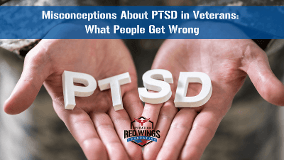Misconceptions About PTSD in Veterans: What People Get Wrong
Post-Traumatic Stress Disorder (PTSD) is a condition that many Veterans experience after facing the physical and psychological hardships of military service. Despite increasing awareness, misconceptions about PTSD still abound, often leading to misunderstanding and stigma. In this blog, we’ll debunk some of the most common myths about PTSD in Veterans and provide clarity on what PTSD really is, what it isn’t, and how we can better support those affected.
- Myth: PTSD Only Affects Combat Veterans
One of the most pervasive misconceptions is that PTSD only impacts Veterans who served in combat roles. While combat can certainly be a trigger, PTSD can develop in response to any traumatic event, including non-combat-related experiences such as military sexual trauma (MST), accidents, or other high-stress situations. Veterans who never saw direct combat but were exposed to prolonged periods of stress or trauma can also develop PTSD.
Reality: PTSD can result from any traumatic event, not just combat. Veterans across various roles may experience it.
- Myth: PTSD Means Veterans Are “Broken” or “Dangerous”
There’s an unfortunate stereotype that Veterans with PTSD are unstable or pose a danger to themselves and others. Media portrayals often emphasize extreme cases, leading to the belief that PTSD equals uncontrollable rage or violence. However, most Veterans living with PTSD are not violent or unstable.
Reality: Veterans with PTSD are not “broken” or dangerous. With the right support and resources, they can lead healthy, fulfilling lives.
- Myth: PTSD Shows Up Immediately After Trauma
Many people believe that PTSD manifests right after a traumatic experience. However, PTSD symptoms can emerge weeks, months, or even years after the event. Veterans may not initially display signs of PTSD, leading to delayed recognition and support.
Reality: PTSD can have a delayed onset, and symptoms may not appear until long after the trauma.
- Myth: Veterans with PTSD Just Need to “Get Over It”
A common but harmful misconception is that PTSD is something Veterans should simply “move on” from, and that they should be able to shake it off with willpower alone. This idea ignores the fact that PTSD is a medical condition that requires treatment, care, and often professional support. It’s not something that can be willed away.
Reality: PTSD is a serious mental health condition that requires proper treatment. Recovery is a process, not something to just “get over.”
- Myth: PTSD Only Affects Mental Health
PTSD is often viewed as purely a mental health issue. While it’s true that the condition can severely affect mental well-being, it can also lead to physical symptoms such as chronic pain, fatigue, and sleep disturbances. PTSD can disrupt a person’s entire body and daily functioning.
Reality: PTSD affects both mental and physical health, and its symptoms can vary widely from person to person.
- Myth: Seeking Help for PTSD Is a Sign of Weakness
In the military, where strength and resilience are highly valued, many Veterans feel that seeking help for mental health challenges makes them weak or incapable. This stigma can prevent Veterans from accessing the care they need. In reality, reaching out for help is a courageous act of self-care.
Reality: Seeking help for PTSD is a sign of strength, not weakness. It takes courage to prioritize mental health and well-being.
- Myth: Veterans with PTSD Can’t Work or Live Productively
Another misconception is that Veterans with PTSD cannot hold down a job, be productive members of society, or live fulfilling lives. While PTSD can present challenges, many Veterans successfully manage their symptoms with therapy, medication, and coping strategies, allowing them to lead productive lives both professionally and personally.
Reality: With the right treatment, Veterans with PTSD can work, lead families, and contribute meaningfully to their communities.
Where to Start Your Healing Journey: ORWF Retreats
If you or a Veteran you know is struggling with PTSD, Operation Red Wings Foundation (ORWF) retreats offer an excellent place to begin the healing journey. These retreats are designed specifically for Veterans, by Veterans, offering a unique support system where participants can connect with others who have shared similar experiences. The ORWF retreats provide access to a range of therapeutic tools, including yoga, meditation, counseling, and alternative therapies like Alpha-Stim and Battlefield Acupuncture, which can to help manage PTSD, mTBI, and chronic pain.
At ORWF, Veterans helping Veterans is at the heart of everything. The camaraderie and understanding that comes from shared service allow for deeper connection and trust, creating a safe space for healing. Whether you are just starting your journey or have been struggling for years, ORWF retreats can provide the resources, support, and community you need to take those first steps toward recovery.
Understanding the realities of PTSD is crucial in fostering a supportive environment for Veterans. By debunking the myths surrounding PTSD, we can reduce stigma and promote a more compassionate, educated approach to this complex condition. Veterans have served and sacrificed for us; now it’s our turn to serve them by ensuring they receive the respect, understanding, and support they deserve. If you’re a Veteran struggling with PTSD, consider attending an ORWF retreat—where healing begins, and hope is restored. Start here: https://orwfoundation.org/






